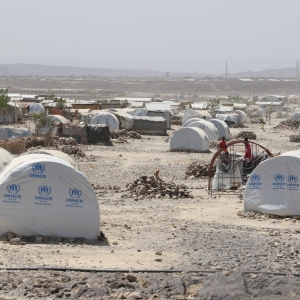Federal Water Tap, December 7: Government Awards Coronavirus Sewage Testing Contract
The Rundown
The Department of Health and Human Services chooses an Arizona company to lead a national sewage testing program. The EPA reverses its stance on a flood-control project in Mississippi and announces an “interim strategy” for PFAS compounds in wastewater. The Bureau of Reclamation recommends a water-supply project in North Dakota that diverts Missouri River water to the state’s eastern region. Texas seeks to operate its own coal waste permitting program. The EPA’s internal watchdog assesses the agency’s response to drinking water problems in the Caribbean after hurricanes Irma and Maria. The EPA watchdog will investigate how the pandemic has affected Superfund cleanups. The IJC will release a report on Thursday on Great Lakes water quality. And lastly, an EPA official provides a timeline for finalizing lead rules for drinking water.
“We expect to promulgate the Lead and Copper Rule very soon. If not by the end of the calendar year, then early in the new year.” — Eric Burneson, director of the U.S. Environmental Protection Agency Standards and Risk Management Division, discussing when the agency would finalized new rules for lead in drinking water. Burneson spoke at a meeting of the National Drinking Water Advisory Council on December 2.
By the Numbers
40: Number of PFAS compounds that would be analyzed in a method that is undergoing validation. There are thousands of such compounds in circulation. Current government-approved methods can test for 29. (EPA)
News Briefs
Sewage Surveillance
The Department of Health and Human Services awarded a $5.5 million contract to an Arizona State University spinoff company to head up a national system that will test sewage for traces of the new coronavirus.
The aim of the program, which is free for utilities, is to monitor 30 percent of the country’s population for evidence of the virus by testing sewage.
The contract went to AquaVitas, a company that grew out of the Biodesign Center for Environmental Health Engineering.
In context: Enthusiasm But Obstacles in Using Sewage to Monitor Coronavirus
EPA Okays Mississippi Flood Project
In a reversal, the U.S. Environmental Protection Agency is now giving its blessing to a flood-control project in Mississippi that the agency had vetoed during the George W. Bush administration, E&E News reports.
The current version of the Yazoo pumps project is slightly different than its predecessor – which is why the agency is taking the unusual step of contradicting its earlier assessment. Still, pumping is expected to change the hydrology for more than 38,000 acres of wetlands.
PFAS in Wastewater
The EPA published a five-page memo that lays out an “interim strategy” for dealing with PFAS compounds in wastewater discharges that require a federal NPDES permit.
The strategy is a stopgap measure until the agency sets out formal rules under the Clean Water Act for regulating the compounds in wastewater.
Much of the strategy consists of incorporating monitoring requirements into permits.
Studies and Reports
North Dakota Water Project
The Bureau of Reclamation published a final environmental impact statement for a project to supply Missouri River water to areas of eastern North Dakota that are outside of the basin.
Reclamation proposes to share the cost of certain project facilities: an intake and pump station, a water treatment plant, and a feeder pipeline. Up to 165 cubic feet per second would be diverted from an existing canal. (Twenty cfs will be for use within the Missouri River basin.)
The project is not without controversy. The state of Missouri filed a lawsuit in February to prevent the diversion of water outside of the basin. Also, communities in Canada worried about the potential transfer of aquatic invasive species — mollusks, plus microorganisms like bacteria — into the Hudson Bay basin. Minimizing that risk is the purpose of the treatment plant, which will use filtration as well as chlorine and ultraviolet light for disinfection.
Assessing EPA Hurricane Response for Drinking Water Systems
The EPA’s internal watchdog released a report that assessed the agency’s response to hurricanes Irma and Maria in Puerto Rico and the U.S. Virgin Islands.
The Office of the Inspector General found that the EPA could improve its emergency planning and coordination with local officials in order to better respond to the needs of small and rural drinking water systems.
The report recommended three actions: train staff on how to disseminate information after a disaster, expand emergency planning to include local staff, and build capacity of small water systems to respond to disaster. The agency agreed with all three.
On the Radar
Water in the West Hearing
The Natural Resources Conservation Service will hold a public listening session on December 17 to gather input about the most pressing water quantity issues in the western states.
NRCS is the federal agency that works to prevent soil erosion, protect wetlands, and conserve water on agricultural lands.
To register for the session, email WesternWater@usda.gov with your name and organization.
Texas Coal Ash Permitting
The EPA is acting on an application from the Texas Commission on Environmental Quality to allow the state to oversee a permitting program for coal waste.
The EPA will now ask for public comments and will hold a public hearing on February 2, 2021.
Texas is the third state to seek the authority to run its own permitting program.
Pandemic and Superfund Cleanup
The EPA Office of the Inspector General will investigate how the coronavirus pandemic has affected the agency’s Superfund cleanup efforts.
Great Lakes Water Quality Report
The International Joint Commission will hold a webinar on December 10 to release a report on federal actions to improve Great Lakes water quality. The report is required every three years, per an agreement between Canada and the United States.
Federal Water Tap is a weekly digest spotting trends in U.S. government water policy. To get more water news, follow Circle of Blue on Twitter and sign up for our newsletter.
Brett writes about agriculture, energy, infrastructure, and the politics and economics of water in the United States. He also writes the Federal Water Tap, Circle of Blue’s weekly digest of U.S. government water news. He is the winner of two Society of Environmental Journalists reporting awards, one of the top honors in American environmental journalism: first place for explanatory reporting for a series on septic system pollution in the United States(2016) and third place for beat reporting in a small market (2014). He received the Sierra Club’s Distinguished Service Award in 2018. Brett lives in Seattle, where he hikes the mountains and bakes pies. Contact Brett Walton





Leave a Reply
Want to join the discussion?Feel free to contribute!